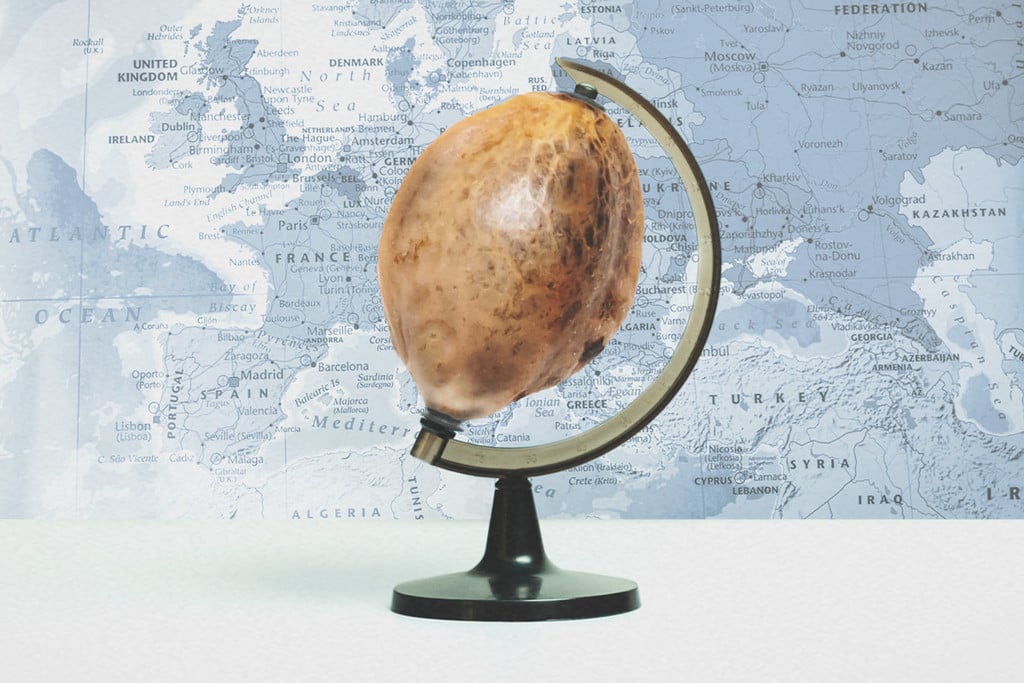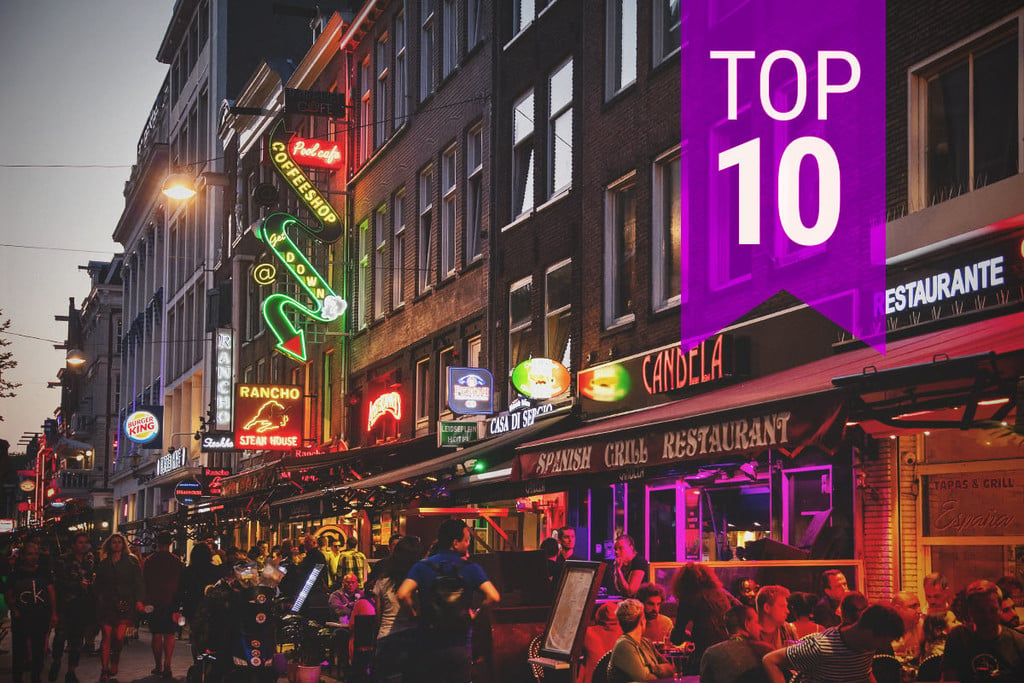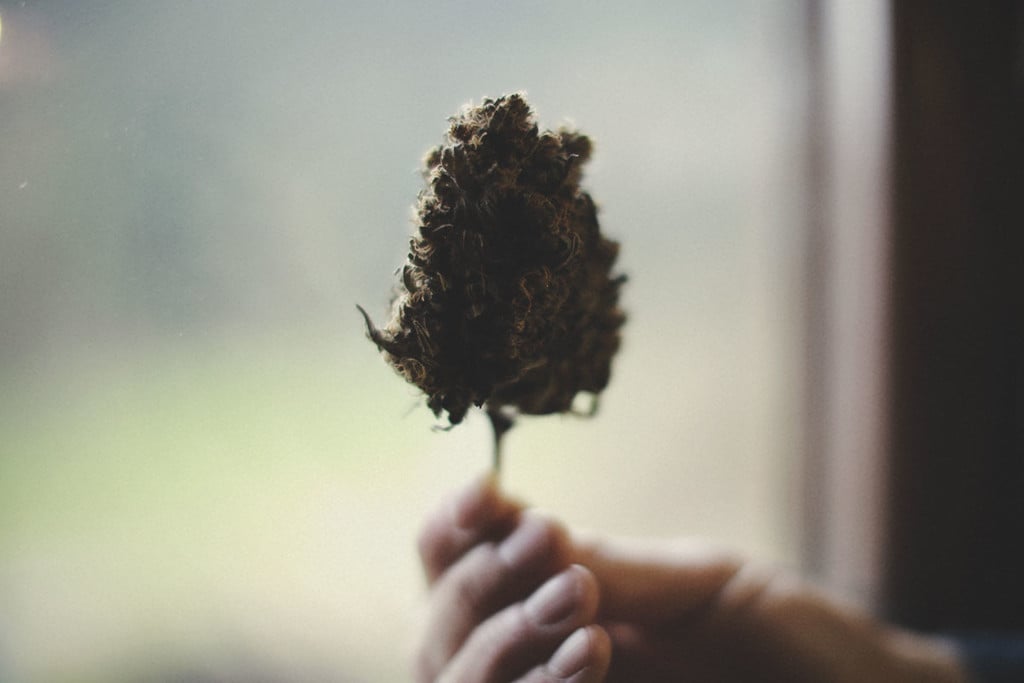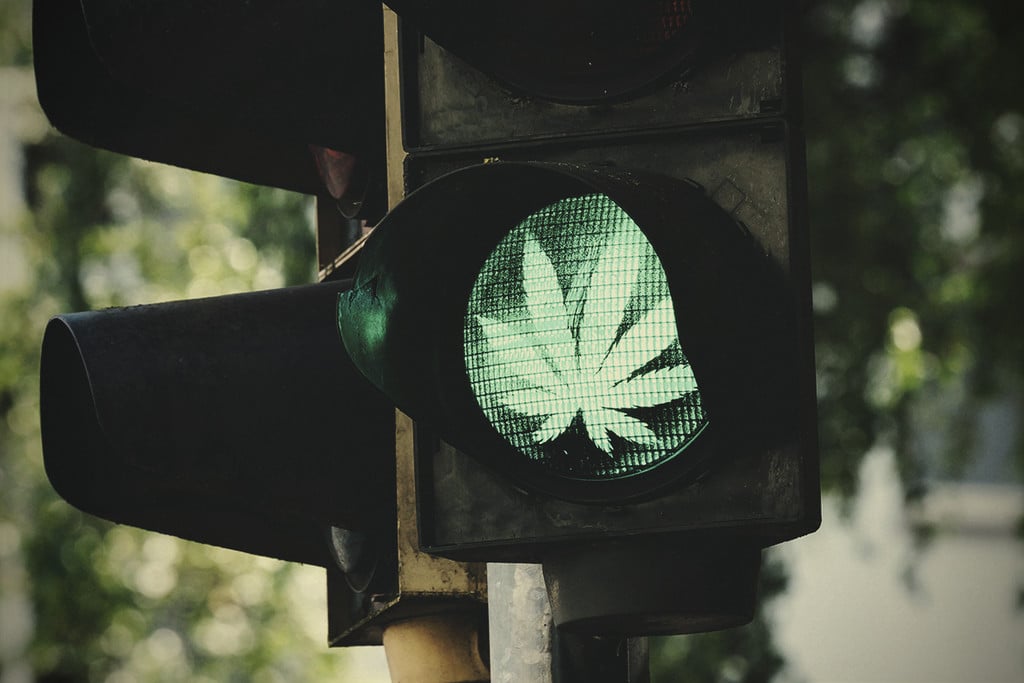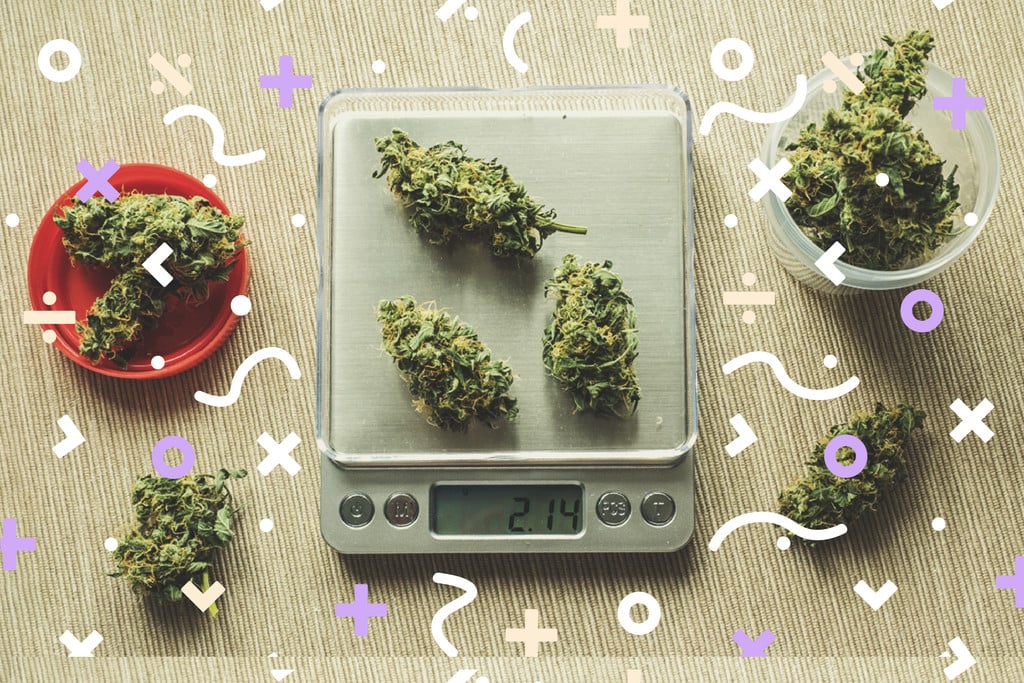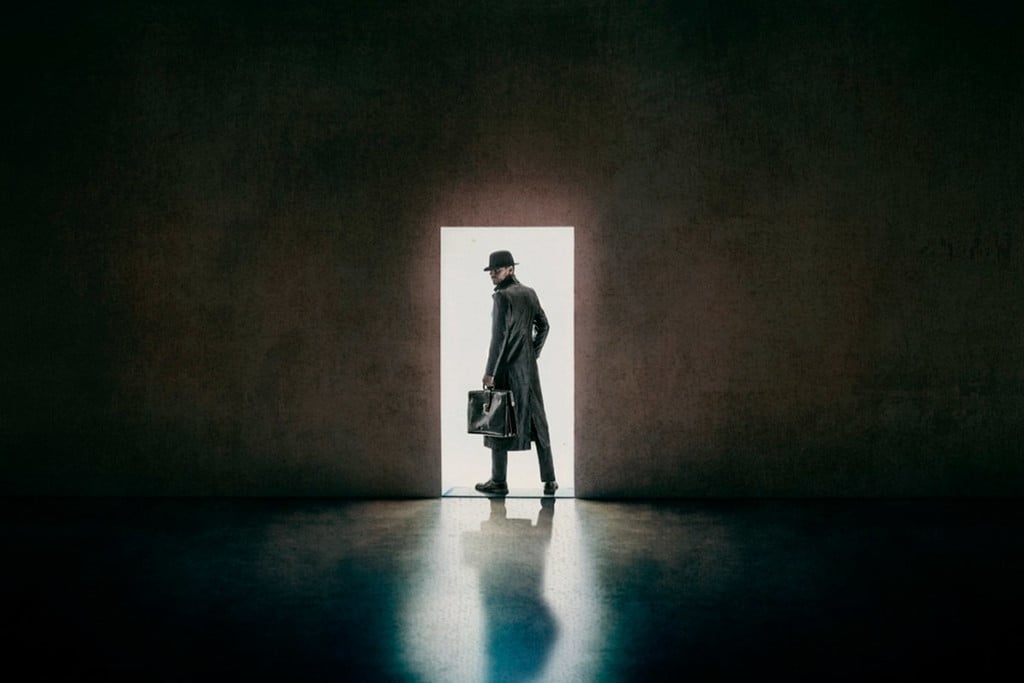.
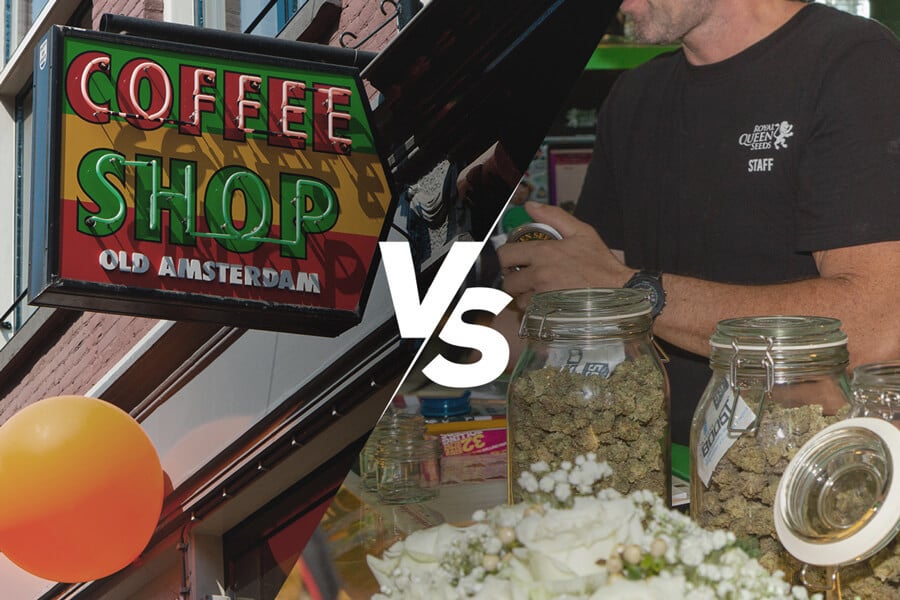
What’s the Difference Between a Coffeeshop and a Cannabis Dispensary?
For some of us, it's still necessary to buy cannabis illegally. However, in a growing number of countries and states, it is becoming possible to buy cannabis without breaking the law. Here we examine two establishments that offer legal, or not illegal, cannabis products: dispensaries and coffeeshops.
While most of us dwell in the shadows when it comes to cannabis, some people live in places where cannabis is either decriminalised or legalized. In these places, you can simply walk into a dispensary, coffeeshop, or cannabis club, peruse a range of cannabis products, and buy whichever suits you—and then you can walk home with it without breaking the law!
Lucky for some.
In this article, we outline the differences between two of the main types of cannabis-centric retailers: coffeeshops and dispensaries.
Contents:
What Are Coffeeshops?
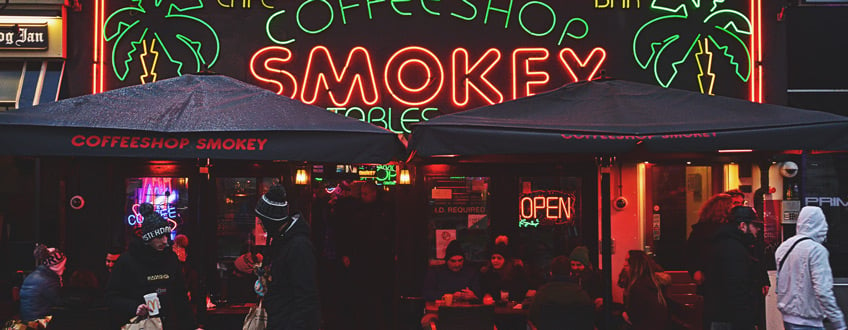
Weed coffeeshops are more or less unique to the Netherlands. In the 1970s, the Dutch government introduced new legislation that effectively decriminalised the sale, purchase, possession, and consumption of cannabis. Notably, though, the production of cannabis is still illegal in the Netherlands.
However, coffeeshops exist in a legal grey area. Technically, the sale and consumption of cannabis there is illegal. But certain cafes can get licences that permit them to facilitate these activities. These coffeeshops exist as such because, in the 1970s, cafes first started acting as a cover for the illicit trade of cannabis products. In time, these illegal clubs became somewhat institutionalised.
So, coffeeshops are cafes licenced to sell cannabis. This is why you will not find a cannabis dispensary in the Netherlands that sells cannabis without food and drink.
What Are Cannabis Dispensaries
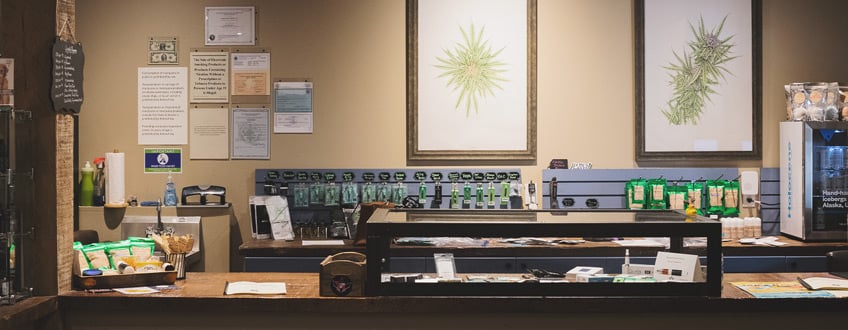
Cannabis dispensaries, on the other hand, are shops that exist solely to sell cannabis and cannabis-related products. They are shops licenced for this purpose, rather than cafes that also have a licence to sell cannabis.
They exist almost exclusively in the US, with some also in Canada. Exactly where dispensaries fit into the law, and how they are allowed to operate, differs on a state-by-state basis. Some can only sell cannabis to those who hold medical certification, others can only sell to members, while some are allowed to sell to anyone over the requisite age.
Cannabis dispensaries are staffed with “budtenders” who are knowledgeable about the products they sell and can advise customers on their purchases. As dispensaries source their cannabis from legal grow operations, they tend to stock a wide variety of very high-quality cannabis products.
How Do Coffeeshops and Dispensaries Compare?
While there are obvious similarities between coffeeshops and dispensaries, there are clear distinctions between the two as well.
🍁 Selection
On the whole, dispensaries stock more in the way of cannabis strains and products. For instance, you are likely to find cannabis flower, hash, concentrates, edibles, vape cartridges, and more. In coffeeshops, your choice will likely be limited to flower, hash, and edibles—and the selections themselves will probably be more limited.
Moreover, dispensaries offer more regarding cannabis plants and cultivation necessities. For instance, you can find seeds, clones, and cannabis plants for sale in some dispensaries. You won’t find these in Dutch coffeeshops.
👛 Price
The prices can vary significantly in both coffeeshops and dispensaries. In dispensaries, though, you’ll probably find a greater range. Shops may stock products that range from discounted bags of cannabis “shake” all the way up to top-tier flower, edibles, concentrates, and hand-crafted blunts ready to light up.
In Dutch coffeeshops, the choice will be more limited, and as such, so will the price range.
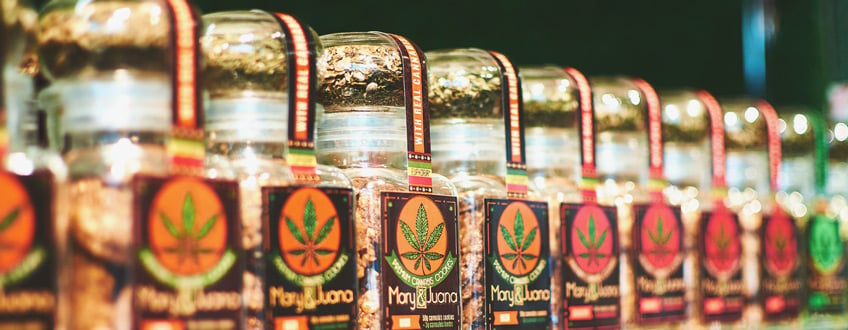
🆘 Services
Coffeeshops exist primarily to serve the recreational customer. They are certainly only licenced to sell on a recreational basis, and not as a medical service. Therefore, the services they offer might be limited, though this differs from shop to shop. Some have very knowledgeable staff capable of giving comprehensive advice about the bud on offer, whereas others will not know very much about their products.
Dispensaries, on the other hand, tend to take their roles very seriously. In part, this is because they were first established to service customers who required weed for medical reasons. As such, it was necessary that the staff were very informed about the products available. This culture has continued, and those who shop in cannabis dispensaries often find the staff to be a trove of knowledge.
🔺 Accessibility
Who can access coffeeshops and dispensaries depends on the location, and the local laws. For instance, in most of the Netherlands, anyone over the age of 18 can access and use a cannabis coffeeshop. But there are locations where this isn’t true.
Take Maastricht, for example—a city that lies near the borders of both Germany and Belgium. For a long time, locals from these countries would cross into Maastricht to buy their cannabis and take it back to their home country. In response to this, there are now local laws that only allow Dutch residents into Maastricht coffeeshops—and they are strict on it.
As mentioned, where you are in the US determines who can access dispensaries. In some places it’s very liberal, while in others it can be quite limited. In most cases, you must be 21 years of age or older to access recreational weed, or 18 years of age and with a medical card to access medical marijuana.
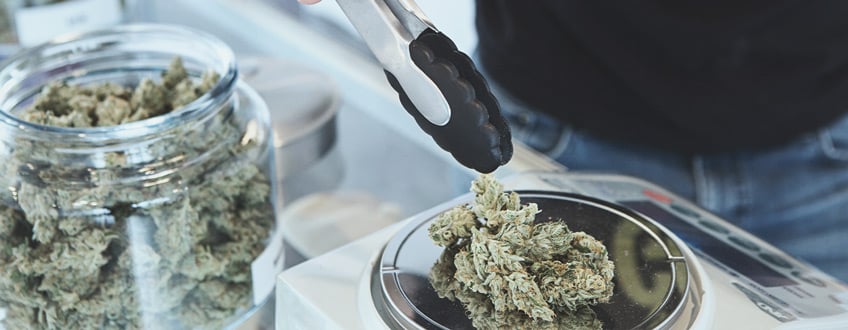
What Other Cannabis Establishments Are There?
While dispensaries and coffeeshops are perhaps the two most famous examples of establishments where you can legally (or not illegally) buy cannabis, there are several other places where someone can buy cannabis, cannabis-related products, and other psychoactive products.
1. Cannabis Clubs
Cannabis clubs are Uruguay and Catalonia’s answer to the question of how to sell weed. These operate similarly to Dutch coffeeshops by also operating via legal grey areas. They also tend to operate as cafes.
The two main differences are that cannabis clubs are technically members-only clubs, where new members must be invited by existing members. While some remain fairly exclusive, there are also those that offer invites to essentially anyone who wants to come and buy some weed.
The second difference is that they are not technically allowed to profit from the sale of weed. Therefore, any money given to them is given to the club to help cover expenses, not as a direct transaction between a customer and an establishment selling cannabis. It just so happens that in order for them to give members cannabis, a donation of 10–20 euros per gram is usually required.
Unlike in the Netherlands, where the production of cannabis is illegal, cannabis clubs are legally allowed to grow a certain amount of weed per year, which is determined by the number of members belonging to a club.
2. Headshops
Headshops are physical or online establishments that sell drug-related paraphernalia, but not the substances themselves. Therefore, any shop that has walls lined with bongs, pipes, rolling trays, etc., could be called a headshop. These can be found all over the world. And while some establishments may offer cannabis under-the-table, most operate completely legally and will not sell you weed itself.
3. Smartshops
Smartshops are very similar to headshops, except they also sell psychoactive substances, and sometimes cannabis seeds. In the Netherlands, these substances include magic truffles and mescaline-containing cacti, which are so-called “soft drugs”.
In other countries, smartshops might sell legal “research chemicals” that market themselves as “not for human consumption” but are in fact untested and unregulated drugs.
A word of caution: there is usually very little known about the effects of these novel research chemicals, and so it’s probably best to avoid them. The fact that they are legal is no indication whatsoever that they are safe.
4. Nonprofit Cannabis Organisations
These nonprofit organisations are basically the same as cannabis clubs, except they exist as nonprofit through choice rather than legal necessity.
These clubs consist of members who pool money, time, and energy together in order to produce cannabis. By working together, people are able to grow a variety of different cannabis plants, and therefore have access to a much wider range of products compared to those who go it alone.

Getting Access to Legal Weed
If you live somewhere that allows the sale of cannabis, then using these establishments is, for most people, the best bet for getting hold of good-quality cannabis. Usually, you’ll be able to find a product/strain that suits you, and the staff will be able to inform you about the products.
If you live somewhere where cannabis remains illegal, then your best bet is to try and find a good dealer!


























